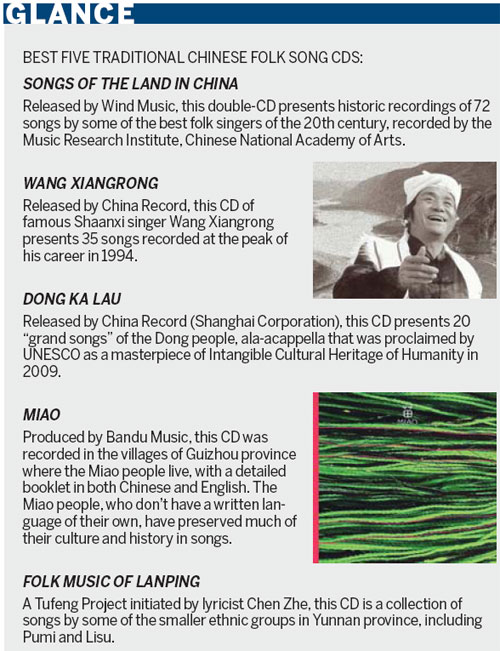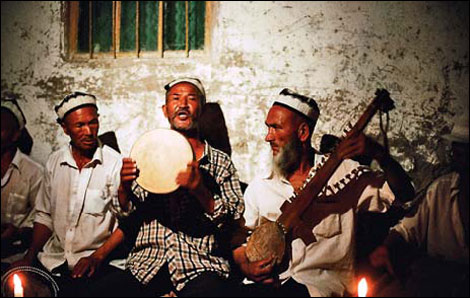They're old tunes, but sound ones
Updated: 2012-04-20 07:52
(China Daily)
|
|||||||||||
|
|
Comment | Mu Qian
The biennial CCTV Young Singers' Competition has suspended this year's show. Although I'm not a fan of the competition, I will miss its traditional songs category, which will showcase folk singers from all over the country.
For many people, the competition used to be the only chance to hear authentic traditional Chinese folk songs, which are rare these days.
As an ardent fan of roots music, I have tried to collect as many traditional Chinese folk song CDs as possible over the years, but there are not many in the market. I have less than 20 CDs.
Labels releasing traditional folk songs are hard to find. To my knowledge, China Record and Bandu are the only two companies in the mainland. China Record has only released four CDs, and Bandu three. Together with sporadic releases from other smaller companies, the total number of traditional Chinese folk song CDs is negligible.
Most of the folk songs are recorded amateurly and are only available at the villages of origin, which is a pity.
To illustrate, if you are interested in the original folk songs from northwestern Shaanxi province, there is probably only one CD in the market by singer Wang Xiangrong released by China Record in 2006. For more, you need to travel to Shaanxi's countryside where only the older folks there know those songs.
With its vast size and diverse ethnic groups, China is a rich resource of folk music, but the younger generation has never heard of most of them.
Ironically, you may be able to find some of these recordings outside the mainland or overseas. For example, if you are interested in Dolan Muqam, a traditional music by the Uygur people, Wind Records of Taiwan and the Ocora Company of France have some collections.
Today, Chinese folk singers are increasingly mimicking Western music rather than appreciating and propagating their own heritage. This is partly because of their own lack of knowledge about the origins of their inheritance.
Last year, Bob Dylan's China tour aroused much attention. When he performed one of his classics A Hard Rain's A-Gonna Fall, audience members in the Beijing Workers' Gymnasium screamed with excitement. But fervent Dylan fans know that the tune came from an Anglo-Scottish border ballad called Lord Randall. Traditional folk music had a great influence on Dylan. Out of the 13 tracks in his first album, only two were his own compositions, while the rest originated from traditional folk songs.
Dylan has also adapted traditional melodies in many of his other albums but kept his lyrics contemporary. Based on British and North American folk music, Dylan developed his own style and played an important role in the revival of folk music in the 20th century. Blowin' in the Wind is an adaptation of the old spiritual song No More Auction Block. Masters of War came from the English folk song Nottamun Town. The Times They Are a-Changin' was influenced by the Irish and Scottish ballads Come All Ye Bold Highway Men and Come All Ye Tender Hearted Maidens.
Unfortunately, China has yet to produce an equivalent of Dylan, who is able to develop songs rooted in the Chinese aesthetics and at the same time incorporate contemporary lyrics.
One reason is that in China, traditional music is not part of mainstream education. Apart from students of music conservatories, others are not exposed much to folk music.
The Ministry of Culture has sponsored Collection of Chinese Folk Songs, a series of anthologies covering over 40,000 folk songs from all over the country. But without accompanying recordings, the books serve little purpose. Folk songs are, after all, sounds.
We don't have the Library of Congress recordings like the Americans do. Field recordings by ethnomusicologists are all archived in academic institutions, off limits to the public.
Folk songs, which used to be passed down orally from generation to generation, are marginalized in this new media age. If they are not recorded and promoted, they will be gone. The overall downgrading of the recording industry has certainly contributed to the agenesis of folk CDs, but it is also sad to note that folk songs are often dealt with contemptuously in China, in the face of imported culture.
Perhaps the government, NGOs and academic researchers should establish a museum or library of sounds to preserve this priceless treasure.
While commercial companies should increase the recordings and promotion of this genre of music. Otherwise, Chinese risks becoming strangers of their own heritage. Through these efforts, who knows, we might be able to see a revival of Chinese folk songs.
Contact the writer at muqian@chinadaily.com.cn

Today's Top News
Rescuers race against time for quake victims
Telecom workers restore links
Coal mine blast kills 18 in Jilin
Intl scholarship puts China on the map
More bird flu patients discharged
Gold loses sheen, but still a safe bet
US 'turns blind eye to human rights'
Telecom workers restore links
Hot Topics
Lunar probe , China growth forecasts, Emission rules get tougher, China seen through 'colored lens', International board,
Editor's Picks

|

|

|

|

|

|






